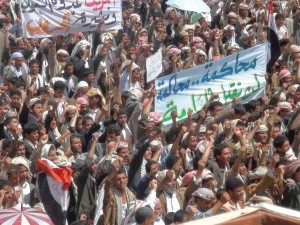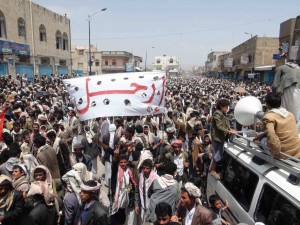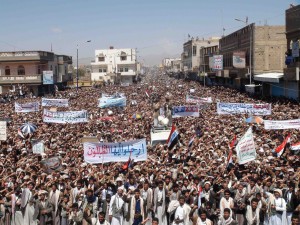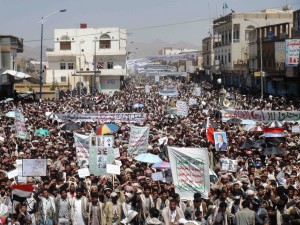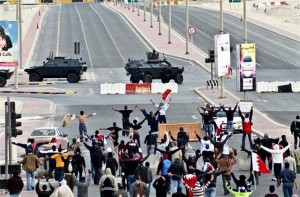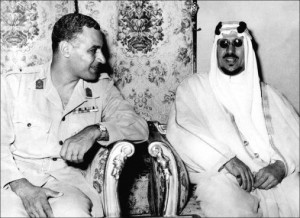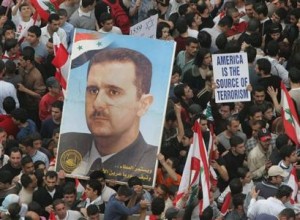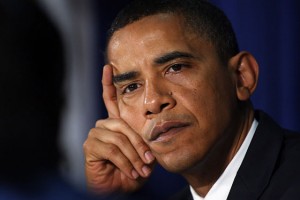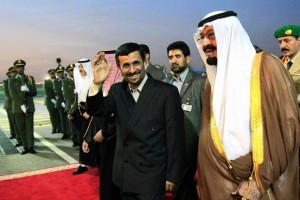
We return from a recent trip to the region persuaded that the main question engaging people with respect to the “Arab spring” is no longer “who’s next,” but rather “how far will Saudi Arabia go in pushing a counter-revolutionary agenda” across the Middle East? Whether Saudi Arabia is really capable of coping with the momentous changes going on in the region — not just with respect to demands for political change in a number of Arab states, but geopolitically, as well — is a truly profound and important question. To unpack this, it is helpful to take a historical perspective on Saudi Arabia and its traditional national security strategy.
Unlike Iran and Turkey, many Arab states are not, within their current boundaries, “natural” states. Most, in fact, are the creations of colonial powers, at least within their present borders — e.g., Iraq, Jordan, Lebanon, Syria, and the smaller GCC states all fit this bill.
Saudi Arabia, like Egypt, is an important exception to this generalization. But, in contrast to Egypt, Saudi Arabia is not a historically “natural” state. The Saudi state was definitely created — but by indigenous actors, not outsiders.
Saudi Arabia is the product of hard-fought tribal wars and alliances, legitimated by an indigenously generated ideology — that is, the particular form of Islam that has been championed by the al-Saud since the mid-18th century, commonly known in the West as wahhabi (though many Saudis resist the term), and described by many of our Iranian interlocutors as salafi (though that strikes us as a more general term that can apply to Sunni Muslims who do not follow a Saudi-prescribed religious line). Buttressed by its massive oil wealth, the Kingdom of Saudi Arabia has emerged as a formidable, “home grown” political entity.
Since the consolidation of the modern Saudi state in the 1920s and 1930s, the Kingdom has turned to the United States as its principal external security partner. There were two main reasons for the Saudis’ original alignment with Washington: America had no legacy of colonial entanglements in the Middle East, and it was not Britain. At least some Saudi princes believe, to this day, that, but for the British, the al-Saud would have ended up controlling the entire Arabian peninsula, including territories now occupied by the smaller Gulf Arab states. And, in the 1930s, King ‘Abd al-Aziz ibn Saud was worried that London would try to weaken his autonomy and bring the new Saudi state firmly under British influence, along with its Bahraini, Kuwaiti, and other Gulf Arab wards.
The United States seemed the best available hedge against that — so, American oil companies received the first major oil concession in Saudi Arabia, in 1933. After World War II, the Kingdom developed a deep and multi-faceted strategic relationship with the United States. In essence, America and Saudi Arabia both wanted to cooperate in balancing against other external powers seeking to expand their influence in the Persian Gulf — but, during the Cold War, the major external power of concern was no longer Britain but the Soviet Union.
This record helps us understand the principal objectives and major elements of Saudi Arabia’s current national security strategy. The Kingdom wants to have at least a quasi-hegemonic status on the Arabian peninsula; at the same time, it does not want another regional state to attain what it would see as hegemony over the Middle East as a whole. And, even in the post-Cold War period, the Saudis have wanted to see their relationship with the United States as the ultimate guarantee of their security and survival.
Today, that strategy is in crisis on all fronts — and the Saudis are not handling it well.
The strategy is in crisis, first of all, because of Riyadh’s plummeting confidence in the reliability and competence of the United States as a security partner. This dynamic is not, per se, new. The Kingdom grew increasingly disenchanted with various aspects of America’s Middle East policy during the 1990s — disenchantment intensified by the various traumas that fallout from the 9/11 attacks inflicted on U.S.-Saudi relations. (The militancy associated with the religious ideology promoted by Saudi Arabia over decades has generated a number of significant security problems for the United States.)
But the Saudi leadership — including, it would seem, King Abdullah himself — is both enormously angry and deeply unsettled by what it sees as Washington’s abandonment of Egyptian President Hosni Mubarak. Egypt is a critically important state for the Saudi — and it has not always been a friendly one. Mubarak’s predecessors, Nasr and Sadat, both challenged Saudi Arabia, in diametrically different but powerful ways. And now that Egyptian political order, the orientation of which is so strategically consequential for Saudi Arabia, is again up for grabs. So, while Western assessments have tended to criticize President Obama and his Administration for being too slow in supporting “forces of change” in Egypt, from a Saudi perspective the Obama Administration dropped Mubarak much too quickly, squandering opportunities to support him in pushing back against those demanding his removal.
On the regional front, the Saudis are discombobulated by what they see as a rising tide of Iranian influence across the Middle East. The Islamic Republic’s allies have been winning, politically, in key venues — Iraq, Lebanon, Palestine. Historically, the Saudis have never been big fans of pan-Arabism. But, in recent years, senior Saudi princes have, with increasing frequency, denounced what they have come portentously to call Iranian “interference” in “Arab affairs.” Now, with the Arab spring, the Saudis are alarmed that the influence of the Islamic Republic and political forces friendly to it will rise even more dramatically. The Saudis are even more alarmed about the potential geopolitical consequences of these developments — e.g., the high likelihood that post-Mubarak Egypt will enjoy improved relations with the Islamic Republic.
So, as the Saudi state sees itself increasingly “encircled” by multiple and expanding threats, Saudi leaders are doubling down on the fundamentals of their traditional national security strategy — military force to ensure its dominance on the Arabian peninsula, the use of religious ideology to raise sectarian concern about rising Shi’a influence, and putting enormous financial resources on the table (e.g., $30 billion for Bahrain) to further its goals. This approach is clearly reflected in the Kingdom’s response to recent events in Bahrain, culminating in the dispatch of Saudi military forces to repress popular protests there.
But Bahrain is not the only place in the region where the Saudi counter-revolution is being felt. Saudi initiative was critical to bringing about the Arab League’s quasi-endorsement of international military intervention in Libya. That amounts to Saudi endorsement of coercive regime change in another Arab state. Regime change is unacceptable in Bahrain, but OK in Libya — the main thing is, the Saudis have reaffirmed their ability to suck the United States onto their side in regional disputes (at those in which Israel is not taking a position at odds with the Saudis).
Washington’s deference to Saudi anxieties could prove almost as corrosive to the possibility of America making critically necessary adjustments in its own Middle East policies as Washington’s deference to Israel.
By Flynt Leverett and Hillary Mann Leverett



